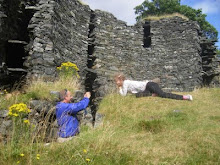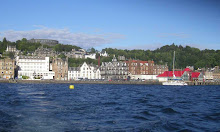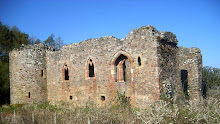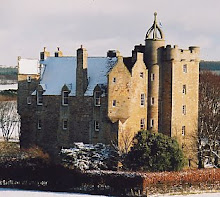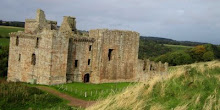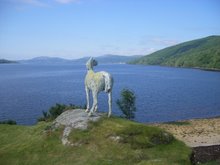 Monday was Crathes Castle with its sensational gardens (right) and 'Royal Deeside' which nearly lived up to its name: we missed Prince Charles and the Duchess of Cornwall by 20 minutes at McEwans of Perth in Ballater.
Monday was Crathes Castle with its sensational gardens (right) and 'Royal Deeside' which nearly lived up to its name: we missed Prince Charles and the Duchess of Cornwall by 20 minutes at McEwans of Perth in Ballater.Yesterday was the trip over here, to Skye. We had planned to come by the six car Glenelg Ferry but it wasn't running, so we swung by Eilean Donan Castle, allowing some to renew old acquaintances, and Irina to take this beautiful shot of Lochalsh with Skye in the distance.

Today we saw Dunvegan Castle, seat of the Macleods, looking proudly over Loch Dunvegan. But beyond the far shore of that loch, beyond the world famous Three Chimneys Restaurant, lie the villages that were 'cleared' by the MacLeods in the 1780s. We visited one of them. It used to be a remote, hard working, close-knit community; now just overgrown stone cottages with a tumbledown church, first consecrated about 1300 years ago, all set by a spectacular waterfall, the shore not far below. As with all clearance villages, it was a thought provoking visit: the residents had committed no crime, there was no Court of Appeal, just the promise of better land in Carolina... if they ever got there.
 If we needed to know more of those times, of that society, and indeed of the one before it, there was no better oracle than Seoras, the storyteller, clad in traditional belted plaid, sitting by the fire in his 'Black House'. As he talked of the myths and legends of Skye, as he stroked his beard and the peat smoke wafted round the simple room, we were all a little mesmerised and left pondering on druids and magical wells.
If we needed to know more of those times, of that society, and indeed of the one before it, there was no better oracle than Seoras, the storyteller, clad in traditional belted plaid, sitting by the fire in his 'Black House'. As he talked of the myths and legends of Skye, as he stroked his beard and the peat smoke wafted round the simple room, we were all a little mesmerised and left pondering on druids and magical wells.











































